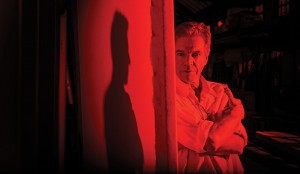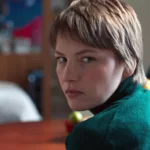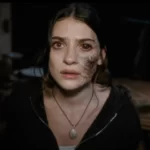Colin Friels is one of the great Australian actors of his, or any other, generation. A master craftsman, Friels is back on stage in Brisbane to take the lead role of Mark Rothko in John Logan’s award winning play, Red. Call Friels an artist and he’ll recoil in horror. The actor brings a commitment and intensity to his portrayal of Rothko that is nothing short of riveting. He shares the stage, for the bulk of the play, with Melbournian Tom Barton who plays Rothko’s fictional assistant, Ken. Friels, for his part, recalls the great character actors of the fifties and sixties while bringing his own gravitas. Barton too shines in his role and plays it with the air of a young Montgomery Clift.
In Logan’s Red, which is directed for the QTC by Alkinos Tsilimidos, Rothko is tormented. Does he take a lavish paycheque to hang his work in a soon to be opened Four Seasons Restaurant in the latest homage to corporate modernism, the Seagram Building, or, keep his credibility and stave off the artistic complacency that can bring a career undone? With the ghost of Pollock on his tail, Rothko also has the ascent of the pop artists of the day to contend with.
The action takes place in a converted YMCA gym that Rothko has transfigured into a painter’s studio. The interview with Friels takes place in a dressing room buried under the bunker that is QPAC.
The thing that strikes you immediately about Friels is his lack of pretension, followed by a devotion to his work. He swears and tells it how he sees it. There’s gentleness in his manner and a fire in his belly. There’s a dislike of the gadgets that dominate the modern world. He loves the outdoors and music and has a keen desire to stay plugged in to current events. The latter informs his work as an actor and, often, the roles he undertakes.
“You’d be mad if you weren’t,” he says of his commitment to following social issues and politics. “[I] don’t see how you couldn’t be. I’ve always been interested in what’s going on. I’m an adolescent of the Whitlam era. When I was twenty, Gough was getting in. I was one of the last draftees for Vietnam. I’m 60 now. My name came out of the hat. The 1960’s had influences … we had the Kinks [laughs]. We had a lot going on.”
“You could get cynical and jaded … you can’t live in NSW and not see how disgusting and corrupt everything is. Those bastards down there are worse than anything you could imagine, probably worse that what you’ve ever had up here. You see what’s happening with Eddie Obeid? Christ knows … fuck me dead; you see what’s happening with the cold seam gas mine? These bastards don’t believe in anything. They put people into servitude with their privatisation. Fuckwits. I long to hear one politician actually say what they believe. But, you’ re not gonna hear it … It’s a catastrophe at a federal level. Give Tony Windsor a couple of years to run the country. Get rid of the other fuckers and give Tony three years.”
After a night performing Red for the MTC in Melbourne a lawyer informed Friels he was a ‘prick’, or at least his character was, because he breached contract. Friels let him know what he could do with his contract. Friels’ fear for the country is that it has become a ‘managed community’, he feels sorry for Julia Gillard who’s forced to be a manager instead of a leader and how the corporate world, or the corporate mentality, has taken over running society.
“I don’t think any corporate mind is capable of running society,” he grimaces. “They might be good at doing the books… but they become like entomologists putting 6000 ants there and another 6000 there… but, I’m sorry, human beings aren’t like that.”
Friels arrived in Australia as a small boy from Scotland. His family first moved to a migrant hostel and then onto the working class suburb of Broadmeadows near the Ford factory. He fell in love with the flatness of the landscape, the dirt, the dry grass and the sun. An enduring memory, after a dreary Scotland, was landing in Australia, taking off his shoes, and feeling the fresh grass under his feet.
“It was beautiful,” he recalls, “but the best bit was landing with BOAC in Darwin. The bloke opened up the door, it was about two or three o’clock in the morning, and the warm wind came in. Geez… it was enough to send you off to heaven. I’ll never forget that. Funny, isn’t it? You never lose that.”
Friels first came to Brisbane some years later to appear in Chekhov’s The Cherry Orchard, with Diane Cilento, before returning later to co-star with Lauren Bacall in Sweet Bird Of Youth. Chat to him for long enough and his love of music comes to the fore. Neil Young and Bruce Springsteen were on his recent concert list and he still has a soft spot for the artists he discovered in his youth like Bob Dylan and the Yardbirds: alongside the pub rock he enjoyed as a teenager when, post a game of footy, he’d go along as a sixteen year old to catch the likes of Chain, Axiom, Max Merritt and the Meteors and, later, AC/DC.
“I don’t have a musical bone in my body,” he confesses. “I can never achieve that, but when you see those giants on stage … that’s what you aspire to as an actor. They’re so human with what they do.”
After tenure at NIDA, Friels devoted his time to the stage and, later, films. When Friels first appeared, to most of us, on screen, he was electric. On stage in Red, he draws on that same energy.
“I thought ‘Christ, I’ve gotta learn how to act,’” he says of his time in the late seventies/early eighties. “I’ve gotta learn how to stand on a stage. I was a very self-conscious young fellow on stage. It was the same mistake I have in life: everything poured out of me. I always admire people that can let a bit of energy out, I try hard to do it some times, but I can’t. Energy just pours out of me and then I’m exhausted.
When it came to an apprenticeship, Friels got his runs on the board in theatre. There’s a theory floating around, popularised by Malcolm Gladwell, that you have to invest thousands of hours to become proficient at anything: then you’ve half a chance of becoming great at it.
“I did almost five years straight in a theatre up to the age of 23,” continues Friels. “I was in a show every week for five years. I didn’t just do one; I’d always be rehearsing at the same time. I’d rehearse in the day and go on stage at night. It culminated in a Dorothy Hewitt play, The Man from Mukinupin. I was Jack Tuesday. They had a great band in it. Noni Hazlehurst and Ruth Cracknell were in it too. They were great roles and I love Dorothy Hewitt, fucking beautiful woman Dorothy: I was playing that at night and I was rehearsing Hamlet for the Royal Court Theatre through the day for a man called William Gaskell and he was the real deal. He was one heavy director. We’d rehearse from 9am till 6pm and I’m onstage for three hours every night. He said to me ‘Yes, yes, you’re working hard. It’s good you’re working hard when you’re young and, then, when you’re older, you’ll know how much you’ve got in the tank’. He was spot on.
“After that I found ways to lose my self consciousness. Around my forties, I started to be able to lose it. And now I know the places I’ve got to put myself in … that’s why I love going to see singers. They’ve got their song and their music, which is a tool to unleash – to let them be un-self-conscious. It’s such a strict form. When you’re just up there speaking with no back up … it can be hard sometimes. It requires a lot of energy.
“I found that acting, as I got on, was about revealing more of yourself. Not in an indulgent way, it’s about being where you are at now at this minute and what you are. You can be playing Mark Rothko; you can be playing Willy Loman, you can be playing in The Cherry Orchard, but what the fuck has life done to you? How can you give of yourself to this audience? You see, for me, it’s all for the audience to hear a story. I’ll give them everything I possibly can to tell them what I understand and what the quintessence of this story is. Its affected me emotionally when I’ve read the play – I have a need, or a longing, to get this story over in the community in a live venue.
Friels has played Rothko in Red previously for the MTC. Then he went on to play Willy Loman in Death of a Salesman for the Belvoir St Theatre. Post QTC’s Red, there could be a new, small, play and then he’ll need a break to recharge his batteries.
“I read Red and thought it was a good play,” explains the actor. “I know it’s going into subsidised theatres and I thought it’d be good for this audience to hear this argument and thought. If someone leaves the theatre and feels better about their fellow human than when they came in, then you’ve got something. If one person leaves thinking ‘I won’t be such a prick to my neighbours tomorrow’, or ‘I won’t smash someone’, and they think ‘It’s pretty good being a human being… I should do something about it’… that’s all [I want]. I’m not on any crusade.
“And [the] story. It’s clichéd to say it, but I think ‘story’ is such an important thing. Not what happened, but what’s it about. The actor’s job is to inflect and give it meaning. That’s why I say, you have to know it, and know what’s going on, because only in your own time will you be able to give that story the meaning of what it is about … not what happened, but what it means to you personally.
“There’s a line I say in this play ‘We’re a smirking nation’. Well, I mean that, in a way, because of what I think. I’m not saying that through Mark Rothko or through John Logan: that’s me saying it. We put on the funny nose and glasses and slip on the banana peel and the TV gets everyone laughing and we’re using our constitutional right to be amused all the time. [The line is] relevant. I’m saying ‘What the fuck are we doing and look at fucking things, don’t just think everything has to be popular, bright coloured, bullshit. Stop trivialising all this shit. Think about what we’re doing’”.
Red plays QTC Playhouse until May 19.
Sean Sennett




